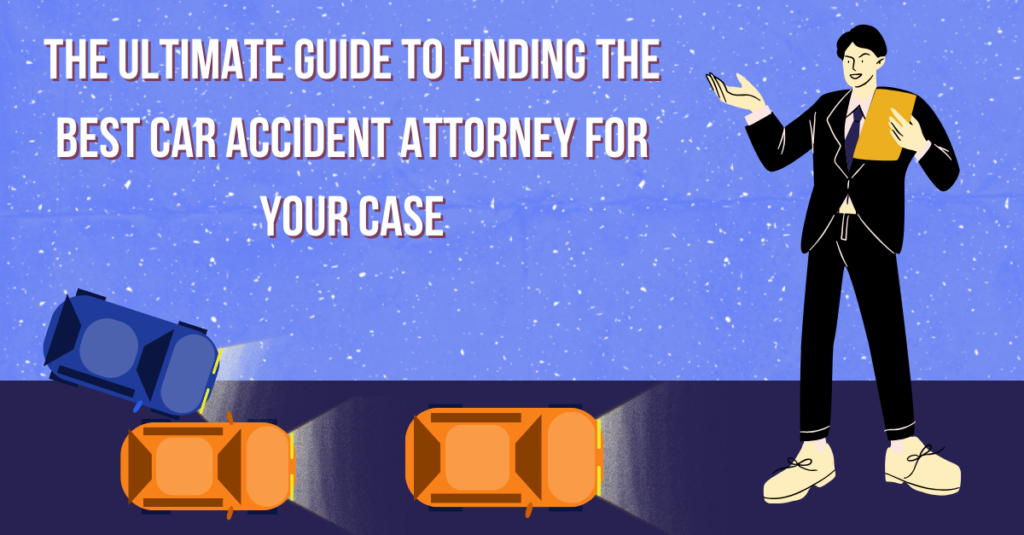The Ultimate Guide to Finding the Best Car Accident Attorney for Your Case
Introduction
Car accidents can be traumatic experiences, leaving individuals grappling with injuries, property damage, and the daunting task of navigating the legal aftermath. In such challenging times, the expertise of a skilled car accident attorney can make a significant difference, ensuring that your rights are protected and that you receive fair compensation for your losses. However, with a multitude of attorneys vying for your attention, finding the right legal representation can be a daunting task. This comprehensive guide is designed to walk you through the process of selecting the best car accident attorney for your case, empowering you with the knowledge needed to make informed decisions.
I. Understanding the Need for a Car Accident Attorney
Before delving into the intricacies of finding the right attorney, it’s crucial to understand why legal representation is essential in the aftermath of a car accident. Car accidents can result in a myriad of injuries and damages, from physical harm to emotional distress and financial losses. Moreover, the legal complexities surrounding personal injury cases, particularly those involving car accidents, necessitate the expertise of a professional who understands the intricacies of the legal system.
II. Qualities to Look for in a Car Accident Attorney

- Expertise and Specialization: Look for an attorney with a specialization in personal injury law, particularly car accident cases. This ensures that the legal professional is well-versed in the specific nuances and complexities of these cases.
- Experience: Prioritize attorneys with a proven track record in handling car accident cases. Experience not only sharpens legal skills but also provides valuable insights into navigating the complexities of insurance companies and court proceedings.
- Track Record of Success: Assess the attorney’s success rate by reviewing past case results. A history of successful settlements and verdicts is indicative of an attorney’s ability to secure favorable outcomes for their clients.
- Communication Skills and Accessibility: Effective communication is key in any legal case. Ensure that your attorney is not only proficient in legal matters but also communicates clearly and is accessible when you need updates or have questions.
- Client Testimonials and Reviews: Take the time to read client testimonials and reviews. This provides insights into the experiences of previous clients and can serve as a valuable indicator of an attorney’s reputation and client satisfaction.
III. Steps to Find the Best Car Accident Attorney
- Research and Compile a List: Begin by researching potential attorneys in your area. Compile a list of candidates through online searches, referrals from friends or family, and recommendations from other professionals.
- Check Credentials and Background: Once you have a list of potential attorneys, thoroughly check their credentials. Verify their educational background, certifications, and membership in relevant bar associations. Additionally, check for any disciplinary actions or complaints against them.
- Schedule Initial Consultations: Narrow down your list and schedule initial consultations with the remaining candidates. These consultations provide an opportunity to discuss your case, assess the attorney’s approach, and determine if they are the right fit for your needs.
- Ask Relevant Questions: Come prepared with a set of questions during the initial consultations. Inquire about the attorney’s experience, their assessment of your case, the legal process involved, and any potential challenges or risks.
- Evaluate Legal Fees and Payment Structures: Understand the attorney’s fee structure. Many personal injury attorneys work on a contingency fee basis, meaning they only get paid if you win your case. Clarify the percentage they will take from your settlement and any additional costs.
- Consider the Attorney’s Approach: Assess the attorney’s approach to handling your case. A good attorney should be proactive, investigative, and willing to go to trial if necessary. Avoid those who make unrealistic guarantees or promises.
IV. Red Flags to Watch Out for When Hiring an Attorney
- Lack of Transparency Regarding Fees: Be wary of attorneys who are not transparent about their fees. A reputable attorney should clearly explain their fee structure and any potential additional costs.
- Poor Communication and Unresponsiveness: Effective communication is crucial in legal proceedings. If an attorney is unresponsive or fails to communicate clearly, it may indicate a lack of commitment to your case.
- Guarantees of Specific Outcomes: Avoid attorneys who make guarantees of specific outcomes. While a skilled attorney can enhance your chances of success, legal outcomes are inherently uncertain, and guarantees should be approached with caution.
- Limited Experience in Personal Injury Law: Ensure that the attorney has sufficient experience in personal injury law, particularly in handling car accident cases. Limited experience may compromise their ability to navigate the complexities of your case effectively.
- Conflict of Interest: Be vigilant for any potential conflicts of interest. If an attorney has a connection to the opposing party or any conflicting allegiances, it may compromise their ability to represent your best interests.
V. The Importance of Legal Fees and Payment Structures
Understanding the financial aspects of hiring an attorney is crucial. In personal injury cases, attorneys often work on a contingency fee basis. This means they only receive payment if you win your case, typically taking a percentage of the settlement amount. It’s essential to clarify the percentage and any additional costs that may arise during the legal process. Negotiating fees and reaching a clear agreement can help prevent misunderstandings and ensure a transparent financial arrangement.
VI. The Initial Consultation: Key Questions to Ask
- Experience: Inquire about the attorney’s experience in handling car accident cases. Ask about the number of cases they have handled and their success rate.
- Legal Process: Seek clarification on the legal process involved in your case. Understand the steps, timelines, and potential challenges that may arise.
- Fees and Costs: Clearly discuss the attorney’s fee structure. Inquire about the percentage they will take from your settlement and any additional costs associated with the legal process.
- Assessment of the Case: Ask the attorney to assess the strengths and weaknesses of your case. Understanding their perspective on potential challenges can help manage expectations.
VII. Checking Credentials and Background
- Educational Background and Certifications: Verify the attorney’s educational background and any certifications they may hold. A strong educational foundation in law is indicative of a well-qualified attorney.
- Bar Association Membership: Confirm that the attorney is a member in good standing with relevant bar associations. Bar associations uphold ethical standards, and membership is a positive indicator of an attorney’s professionalism.
- Disciplinary Actions or Complaints: Research any disciplinary actions or complaints against the attorney. This information is typically available through state bar association websites and can offer insights into their professional conduct.
VIII. Assessing Track Record and Success
- Review Past Case Results: Evaluate the attorney’s track record by reviewing their past case results. Look for successful settlements and verdicts in cases similar to yours.
- Settlements and Verdicts: Assess the attorney’s ability to secure favorable settlements and verdicts. A history of successful outcomes is indicative of their effectiveness in advocating for their clients.
- Trial Experience: Consider the attorney’s trial experience. While many personal injury cases are settled outside of court, having trial experience is valuable in case negotiations fail, and the case proceeds to court.
Conclusion (The Ultimate Guide to Finding the Best Car Accident Attorney for Your Case)
In conclusion, finding the best car accident attorney for your case requires thorough research, careful evaluation, and a clear understanding of your needs. By prioritizing qualities such as expertise, experience, and communication skills, you can narrow down your options to find an attorney who is not only qualified but also a good fit for your specific situation. Red flags such as lack of transparency, poor communication, and unrealistic guarantees should be approached with caution. The initial consultation is a critical step in the selection process, providing an opportunity to ask relevant questions and gauge the attorney’s suitability for your case.
By considering credentials, background, and track record, you can make an informed decision that maximizes your chances of a successful outcome in your car accident case. Remember, the right attorney can make a significant difference in navigating the complexities of the legal system and securing the compensation you deserve.

My name is Rohit Vagh and I’m a content writer specializing in fashion and lifestyle. I have three years of experience in this field and have written various articles. My writing style is creative and engaging, and I strive to create content that resonates with my readers. I have a deep passion for fashion and am constantly researching the latest trends and styles to make sure my readers are up to date. I’m excited to continue my career in blogging, and I’m always looking for new opportunities in the fashion and lifestyle space.





